- Home
- Lloyd Jones
The Man in the Shed Page 5
The Man in the Shed Read online
Page 5
Already it felt like history. And here I suppose this story might have ended. I might try to forget it, and move on, as everyone says. But while standing there with the rude wind in my face, I felt a nagging that had nothing to do with it or the cries of squabbling children over my shoulder. I decided to take myself down to those flax bushes.
A woman office worker sat on the lawn, smoking and sunning her bare legs while she tackled the crossword. She didn’t pay me any attention, though. She didn’t see an anxious middle-aged swamphen creep into the shrub and the flax. It was easy to see where people had burrowed through. The ground was well trampled. I poked around. You could see where sleeping bodies had lain, and in one or two places there were plastic and glass bottles lying among the bark chips. One of the other women, the mother of one of Clara’s friends, yelled out to me. What was I doing down there? What on earth was I grubbing about for? I could hear her laughing voice rallying above the gusting wind. But I pretended not to hear, and went on looking for a piece of Stuart’s white shirt.
lost cities
The daub of brown paint will be Alice’s first building, and working with a quick brush hand Pioneer Towers is up in a jiff. Other than the Towers the surrounding countryside is of a marigold colour, cowlick fields swept back by a steady nor’-wester to the Alps in the west. And just coming onto the canvas—now—is Harry Wills, an Englishman, on the hop from Sydney, whipping his horses across the plains for the Towers. It is late in the day when he draws back the string on his covered wagon. He offers up a hand to his entertainers and they descend and pick their way in gold braid shoes across a muddy street for the new Harold Wills Theatre. It is, as it appears to be, a pale memory, a penny-pinched version of the Globe—not with the same reek of history, of course, but Alice has mixed in some yellow with brown for a weathered look, and stroked in the new/old theatre next to Pioneer Towers. And after the theatre, she plans an eating house and, next to it, a bar, and across the street a police station and gaol. And at the end of the street, a church of sharp cheekbones and high forehead.
Within view of the church Alice adds the farmhouse. A man with a black bag tethers his horse. George Burt, the district veterinarian, has arrived to deliver Alice’s mother, and sew up her grandmother, and make her respectable in death. Towards the top of the painting, near the snowline, Alice sketches in a stone farmhouse, to get to which, many years earlier, George Burt rode a day and a night to deliver Alice’s father.
And here, on the edge of town, Alice adds the Memorial Hall. On New Year’s Eve her father and mother will escape from here into the nearby paddocks. The high-country boy will prod about in the underclothing of Alice’s mother, and less than six months later he will be found twitching nervously in the registry room of Pioneer Towers with its official odour of ink and wood. Through the open door he will cast an eye out to the street where the horses stand flicking the wind from their ears. There he will stand then, curling his toes inside his boots. He is twenty-two years old—old enough, he feels, to be irritated by the sense of truancy entering into what is supposedly an honourable act. In two hours’ time he and Alice’s mother will be making their way to Christchurch for the ‘honeymoon’, a place from which, instinctively, they know there is no return and of which they can hardly bear to speak.
Alice steps back from the canvas, and pulls a face at the muddy town. The details are too large; they need to be scaled down. A few derelict fence posts are needed to lie in the tall grass, a few sagging lines for the church. And perhaps a memorial clock ought to be grafted on to Pioneer Tower for the farmers’ sons who have failed to return.
It also occurs to Alice that sadly there is nothing here for her son, Mark, to recognise or latch on to, except to recall perhaps what a boyish eye once caught from the window of a speeding car. Bless him. Bless my boy and make him grow, Alice says to that part of the canvas, the foreground, which is more familiar.
The scratchy whites and blues are the makeshift shops with their backs to the sea—she can add the details later, because here is the small primary school outside town, where Alice taught and her son attended. And nearby is their home, a cottage, and in the backyard a woman paints at an easel.
Mark is eight years old, and his father has just bought a cray boat. There will be none of the weekend trips or picnics along the coast they had promised each other before packing up house in Christchurch. The cray boat is no pleasure craft. Nor does the fishing timetable respect weekends. To their friends back in the city they boast of a full life, and too little time. Soon there will be no reply, as many of their friends move overseas, or marry, spawning into streams of their own making. The names are on the tip of Alice’s tongue, but the owners’ faces have drifted, and parted company with the bits and pieces of Alice’s memory.
A number of their friends did make it to Richard’s funeral. From others, overseas, came letters and cards of condolence—and a few with chiding tendencies spoke of the ‘enormous perils faced by those who choose to make their living from the sea’, as if Richard had willed the storm—and the boat onto the reef. But there had been kind invitations, too. Summers spent in holiday baches, which she took up for Mark’s sake—to give him a nice memory. That is exactly how Alice thought of it, at the time—the opportunity in later life to recall his feet and toes sinking into sand, a moment’s premonition of the earth’s undertow joyfully ignored, and even shrieked at. But, notably, the first summer Alice decided to stay at home put an end to further invitations.
She created instead summer holidays in the place where they lived. They set up day camps on the sheltered side of the house, and spent all their time between here and the kitchen. At night hot nor’-westers swept down on the town. The wind bellowed in the chimney and the boy climbed into Alice’s bed. In the morning they woke to white clouds running with blind terror. One morning Mark asked her to paint the wind. In a whimsical moment she hurled the jar of grey watercolour over the fence at the beach end of the garden. The paint streaked—then briefly rippled as a gust caught underneath and carried it aloft. A day later it formed a dead skin over a small area of dry scrub and beach shingle—and the wind had gone. In a contrite mood the sea straggled ashore in what would be a day of pleasant surprises. Alice set up the easel for Mark in front of the white Peace rose climbing the trellis against the house; she later returned to find among the painted white flower-heads a splash of black and gold. From Mark’s canvas she traced the rogue colour on the Peace climber, and gleefully announced, ‘A sport.’
She explained to the small boy the aberrant nature of sports, this capacity of a completely different kind of rose to spring unexpectedly from the parent. A sport was outside history. There was no patiently evolved process, no careful layering or natural selection. It just suddenly appeared as its own idea—extraordinary as a new technology or a whole new language. ‘Now we get to name it,’ she told him. He was in a restless mood. She wasn’t even sure he had been listening.
‘Call it “no-name rose”,’ he said.
Alice’s paintbrush returns to the school, fleshing out the temporary prefabs that have stayed on, permanently, a flash of silver for the jungle-gym bar on which Mark once split his lip and ran into the staffroom, blood pouring from his mouth.
The painting, she has decided, ought to hang on the wall above the dining-room table. Alice has in mind those whitewashed walls in the photograph Mark sent of his apartment. She imagines him escorting a young woman around the landscape, imagines them arm in arm, stopping at the playground for a turn on the swings. She imagines the three of them going out for breakfast in town—and, for all his acquired foreignness, Mark delighting in his local knowledge. Of course the young woman will not be able to help herself, sniggering with Mark at the powdered coffee, the painted placemats of great thoroughbreds.
Above the town Alice paints the cemetery. She had been happy to bury Richard here, with its lovely views of the bay. She can remember coming here as a family—just the three of them—and Richard knee
ling down to whisper in a small boy’s ear. ‘On a clear day, you can see South America and the peaks of the Andes. On especially clear days, you can see the back of your own head.’ On that occasion Mark had looked carefully, squinting his eyes up ambitiously—he’d been about to announce a distant landfall when his father, holding back his laughter, placed his hand over the boy’s mouth.
In the weeks after Alice buried Richard she would sometimes spend an hour sitting next to his grave, watching the last of the day depart. One time she measured her own grave—six paces by three—next to Richard’s, and sat there, wondering which memories she ought to take with her. And wondering too at the brilliant sunset—is all this simply for me, my benefit alone? Why aren’t more people around to enjoy it?
Alice paints her way down from the cemetery through the north end of town towards the railway station. She paints a figure hauling a suitcase, although on the day in question she had driven Mark to the railway station. He had come home simply to say he was leaving. An offer of a job had come from an architect in Sydney.
The two days he was home he refused to go out, afraid of who he might bump into. Finally it was time for Mark to catch the train to Christchurch. Alice drove her son to the station. The entire way, Mark looked out a side window. Perhaps, she thought, he’d been making his own last-minute selections: allowing bits of the town to stick to his wandering gaze to take with him across the Tasman.
There was the matter of her parting gift. She had had to dash back to the car. A 1955 issue of Pictorial New Zealand. She shouted through a half-closed window in his carriage, ‘It isn’t supposed to be reading material. Although, of course, you can read it.’
Rita Hayworth, the Hollywood starlet, was featured that month. There she was with her new husband, Dick, and her two small children, Yasmin and Rebecca, eating breakfast, and Rita has leant across to say something vital and interesting to Dick, all ears with a spoon of cereal poised before his lips. This was the magazine Alice had read in the maternity wing while Mark slept alongside. She had held on to the magazine for reasons that evaded her now. There was another story about Haydn’s head being finally returned to the rest of his body, with quite a ceremony in attendance. A priest in sunglasses oversaw the business end, a solemn Italian sculptor bowed over the composer’s open casket and in the background of the photograph there were flashbulbs from the press photographers. Elsewhere in the magazine was another severed-head story—this time a photograph of the tree on which Carl Sylvius Volkner had been strung up, before being dragged by Hauhau rebels into the church, where his head was removed and his blood drunk from a chalice. In the Lifestyle section were tranquil scenes of Milford Sound, night bowls in Parnell; in Dunedin a dog sat patiently outside a butcher’s.
Driving home again, Alice had laughed long and hard at the thought of poor Mark opening up the magazine and wondering which of the stories his mother had marked for his attention. Perhaps all she had meant by the gift was that he had arrived at a certain time and place. He shouldn’t read too much into it: a dog waiting outside a Dunedin butcher’s shop, for instance.
It had been in Mark’s later years, those summers he had come home from university, that Alice felt his disappointment. It clung to him like an illness. From the hallway she spied on her son as he lay on his bed, wide awake, arms folded beneath his head. And, listening to what he heard, Alice too felt the incompleteness, felt his need to be awed, and at that moment she had understood how this yearning for a real city came close to grief.
But then, as she watched from the hallway and plumbed her son’s daydreaming, Alice had been astounded to find him seeding the Canterbury Plains with glass towers and shopping malls, buildings with crested eagles on top, lifts that ran up tower blocks like lit glass balls, and atriums filled with silver trees and tame Amazon parrots. Alice steps back from the canvas and only now, years later, is it clear to her the space her son’s phantom city has occupied. She leans forward, and with her forefinger touches the paint of a tree doubled over from the wind. She finds it hard and dry.
Now, reaching for her paintbrush, Alice begins to reconstruct the tree into something tall and straight and the colour of silver. Now Alice drifts across the city and paints over the empty Theosophical Society building a modern office tower of granite and black glass. Where George Burt delivered her mother, Alice creates a large hospital. A block away, she paints a skyscraper that rises majestically and competitively with the Alps. Between this point on the canvas and the old theosophists’ meeting place, Alice sets about laying down a mesh of shadowed streets and corner pavements splashed with sunlight and lunchtime crowds. She adds in theatres, restaurants, taverns, and in the midst of this city, this phantom city of Mark’s longing, Alice allows for a pocket handkerchief of a park where frisbees float over meadows and young couples lie stapled together. She allows the funny old Colonial replica of the Globe to remain, but over the Harry Wills Theatre she paints the words ‘Restaurant and Museum’—outside its doors, a daub of black for the busker, gold for the trombone.
At the port end of town, quite near the stone steps cut into the wharf where Richard once hoisted up his boatloads of cray, Alice places an opera house and, near it, a fish restaurant and an aquarium filled with performing dolphins and seals for the tourists. Milling among the crowd over the ‘historic’ flagstone area are hotdog vendors, jugglers, pickpockets, thieves of all descriptions. There are yellow cabs, policemen on horseback, a flotilla carrying a beauty-pageant queen. There are marching girls, all with their heads tilted in the same direction. A gunman draws back a curtain in a high-up window masked by a blaze of reflected sunlight. Along another darker canyon there is a candle-lit procession. Over the church hovers Alice’s paintbrush. She hesitates to demolish it because the city will need a soup kitchen for the lives stranded short of the promised land.
Among a cluster of city buildings, she sees one particular striving tower and is about to add a spire when, to her surprise, Alice recognises the Empire State Building. And here, too, is the Chrysler Building with its distinctive gold-chromed capital. And those tenement buildings—from where did they spring? Now she notices the maple trees in what can only be Central Park. When the paintbrush slides from her fingers she does not bother to pick it up. It can wait. She stares at her painting—not quite able to believe what she has done. Up until now she believed this place to be her own sovereign territory. She realises something else as well. Something equally disheartening. She has found out her son. She has located his dreams. Now she picks up her paintbrush and returns to her plagiarised city. This time her eye is drawn to a small inconclusive feature. She can just see a couple of flecks of black and gold outside the old Harry Wills Theatre—and if she squeezes her eyes tight she can make out the beginnings of something quite new and vital … She will give the canvas another hour to dry, by which time she will have worked up her base, and then she will start on the no-name rose. She wonders if her son will remember.
the simpsons in russia
Sometimes they held hands, but not very often. As far as Mr Simpson was concerned holding hands was ridiculous, and his wife knew well enough how it irritated him. But when the bus had left the border to enter Russia and Maggie took her husband’s hand, there was no attempt to wrestle it away. The Simpsons were on their way to Leningrad. At the thought of which Mr Simpson managed a smile: Leningrad, and the idea of taking a bus there. On two occasions he had taken an intercity bus—once, while work was being done on the car; and another time, after Wellington airport was fogged in, he had bussed up to Palmerston North. But Leningrad could not be mentioned in the same breath as these other times of inconvenience. Great armies had marched on Leningrad.
It was Maggie who had planned the trip. Two weeks ago Mr Simpson was reading the Sunday papers in Holland Park and Maggie had asked if he would like an ice-cream. She left him sitting on the bench for rather a long time; at least, it had seemed that way as the sun faded over the city into a bank of cloud. Picnickers reached f
or pullovers; Mr Simpson rubbed his bare arms. Frankly it was irritating to wait that long, particularly so when he viewed his wife returning across a field empty-handed. She hadn’t been able to find an ice-cream vendor, and Mr Simpson had rolled his eyes: it was ridiculous not to be able to find ice-cream in a park on a Sunday afternoon. His wife had walked all the way to Kensington, where she realised—‘silly me,’ she said—that an ice-cream would not survive the return journey. This was the news she returned with, before presenting him with a small cardboard notice. Maggie had found it pinned to a bulletin board in a shop entranceway. The notice—written in both English and possibly Russian—invited ‘interested parties’ to join a bus tour to Leningrad.
Ice-cream, thought Mr Simpson at the passing scenery in the bus window, and alternatively, So this is Russia. It did not seem like a superpower. There was barely any traffic on the road, and the passing farmland looked unproductive and unkempt. All the same he was glad they were off to Leningrad—and not, say, Rome or Venice or those other postcard cities. The Simpsons didn’t know anybody who had been to Leningrad, not even Yvonne, their oldest daughter, who taught English to businessmen in Turkey.
They had to get themselves to Berlin. The rendezvous was a street corner in the Kreuzberg where the unexpected number of daytime prostitutes, Turks, kebab bars and nightclubs had caused the Simpsons some alarm. Mrs Simpson had needed to push her husband from behind to get him to board the bus. It was her idea. She had to provide the enthusiasm. Put a brave face on things. Out of the bus window, Mr Simpson had watched a young man sit down in a shop doorway, roll up a shirtsleeve and plunge a needle into his arm. Mr Simpson felt a sudden rush of panic; and it was perhaps just as well that the way out was blocked by their fellow passengers humping suitcases and cardboard boxes along the aisle. He could smell food, foreign food—the sharp rotten smell of unrefrigerated meat and forgotten cheese. This was the other time on the trip Maggie had reached for his hand and given it a firm squeeze, as if to say, ‘Everything will be all right.’

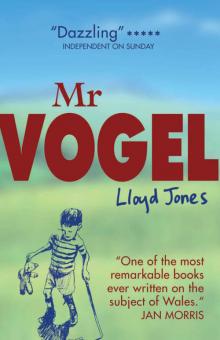 Mr Vogel
Mr Vogel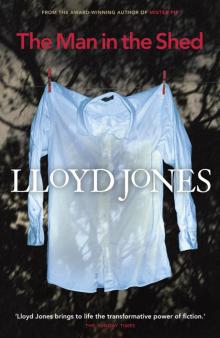 The Man in the Shed
The Man in the Shed Mister Pip
Mister Pip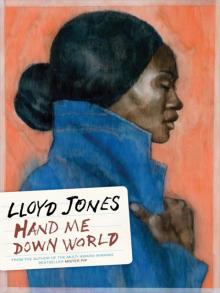 Hand Me Down World
Hand Me Down World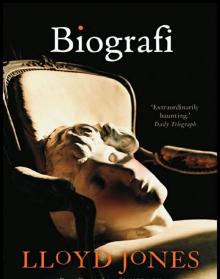 Biografi
Biografi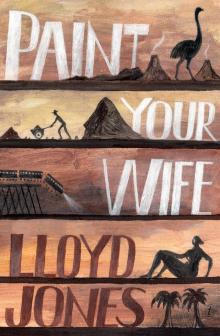 Paint Your Wife
Paint Your Wife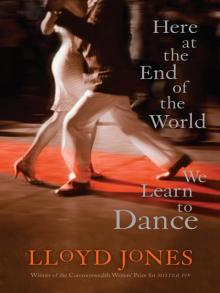 Here at the End of the World We Learn to Dance
Here at the End of the World We Learn to Dance My First Colouring Book
My First Colouring Book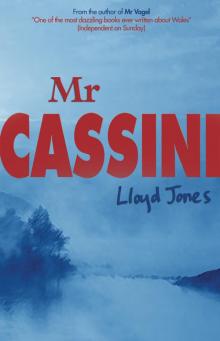 Mr Cassini
Mr Cassini See How They Run
See How They Run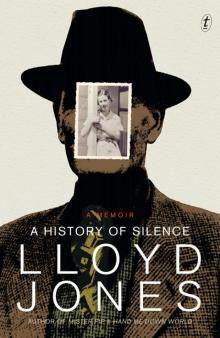 A History of Silence
A History of Silence The Book of Fame
The Book of Fame